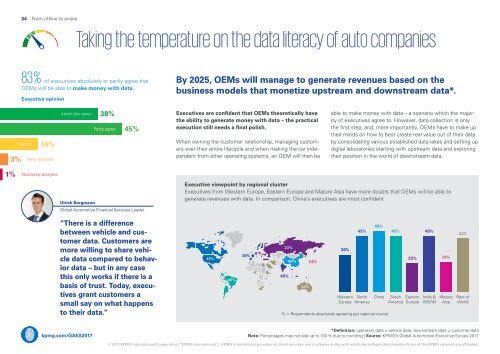Global Automotive Executive Survey 2017
global-automotive-executive-survey-2017
global-automotive-executive-survey-2017
You also want an ePaper? Increase the reach of your titles
YUMPU automatically turns print PDFs into web optimized ePapers that Google loves.
34 From offline to online<br />
Taking the temperature on the data literacy of auto companies<br />
83 % of executives absolutely or partly agree that<br />
OEMs will be able to make money with data.<br />
<strong>Executive</strong> opinion<br />
By 2025, OEMs will manage to generate revenues based on the<br />
business models that monetize upstream and downstream data*.<br />
3%<br />
Neutral<br />
14%<br />
Partly disagree<br />
Absolutely agree<br />
38%<br />
Partly agree<br />
45%<br />
<strong>Executive</strong>s are confident that OEMs theoretically have<br />
the ability to generate money with data – the practical<br />
execution still needs a final polish.<br />
When owning the customer relationship, managing customers<br />
over their entire lifecycle and when making the car independent<br />
from other operating systems, an OEM will then be<br />
able to make money with data – a scenario which the majority<br />
of executives agree to. However, data collection is only<br />
the first step, and, more importantly, OEMs have to make up<br />
their minds on how to best create real value out of their data<br />
by consolidating various established data lakes and setting up<br />
digital laboratories starting with upstream data and exploring<br />
their position in the world of downstream data.<br />
1%<br />
Absolutely disagree<br />
Ulrich Bergmann<br />
<strong>Executive</strong> viewpoint by regional cluster<br />
<strong>Executive</strong>s from Western Europe, Eastern Europe and Mature Asia have more doubts that OEMs will be able to<br />
generate revenues with data. In comparison, China’s executives are most confident<br />
<strong>Global</strong> <strong>Automotive</strong> Financial Services Leader<br />
“There is a difference<br />
between vehicle and customer<br />
data. Customers are<br />
more willing to share vehicle<br />
data compared to behavior<br />
data – but in any case<br />
this only works if there is a<br />
basis of trust. Today, executives<br />
grant customers a<br />
small say on what happens<br />
to their data.”<br />
45%<br />
45%<br />
30%<br />
45%<br />
23%<br />
49%<br />
43%<br />
24%<br />
30%<br />
Western<br />
Europe<br />
45%<br />
North<br />
America<br />
49%<br />
China<br />
% = Respondents absolutely agreeing per regional cluster<br />
45%<br />
South<br />
America<br />
23%<br />
Eastern<br />
Europe<br />
45%<br />
India &<br />
ASEAN<br />
24%<br />
Mature<br />
Asia<br />
43%<br />
Rest of<br />
World<br />
kpmg.com/GAES<strong>2017</strong><br />
*Definition: upstream data = vehicle data; downstream data = customer data<br />
Note: Percentages may not add up to 100 % due to rounding | Source: KPMG’s <strong>Global</strong> <strong>Automotive</strong> <strong>Executive</strong> <strong>Survey</strong> <strong>2017</strong><br />
© <strong>2017</strong> KPMG International Cooperative (“KPMG International”). KPMG International provides no client services and is a Swiss entity with which the independent member firms of the KPMG network are affiliated.



